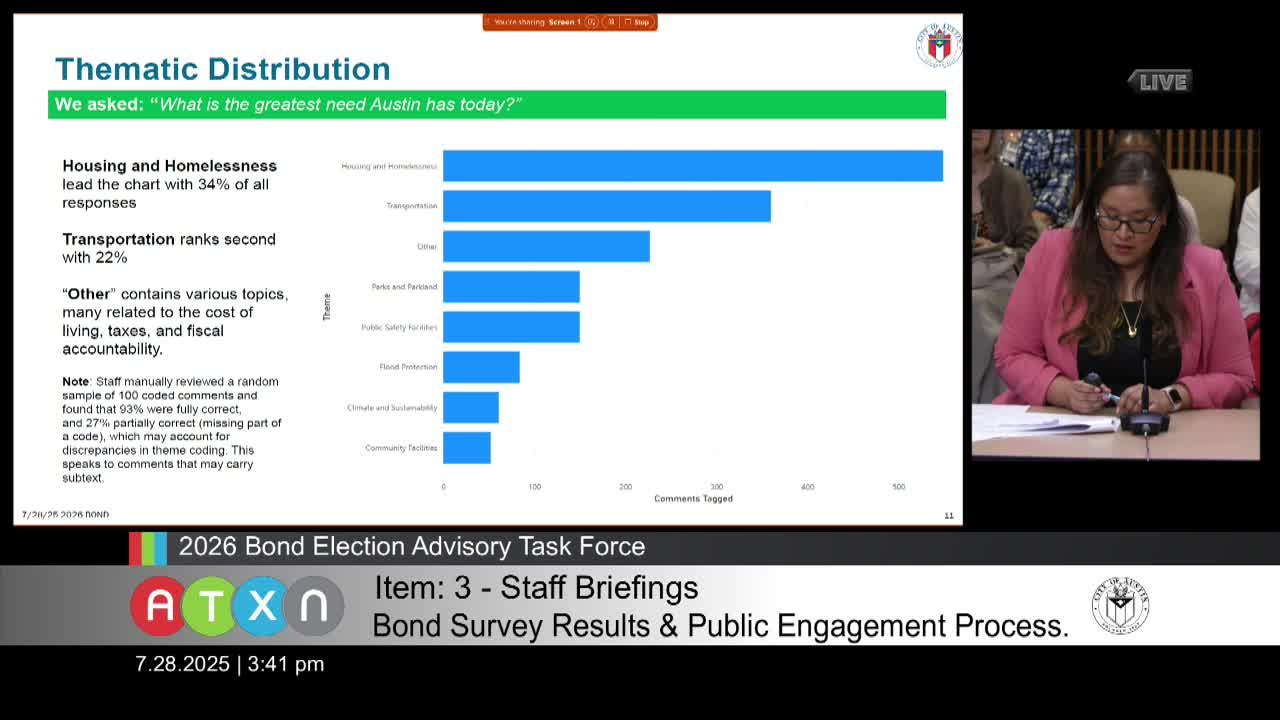Community Survey Reveals Priorities for Housing Transportation and Parks Funding
July 28, 2025 | Austin, Travis County, Texas
This article was created by AI summarizing key points discussed. AI makes mistakes, so for full details and context, please refer to the video of the full meeting. Please report any errors so we can fix them. Report an error »

In a recent meeting of the Austin - 2026 Bond Election Advisory Task Force, city officials and community members gathered to discuss pressing issues that resonate deeply with residents. The atmosphere was charged with a sense of urgency as participants delved into topics that directly impact the cost of living, housing, and sustainability in Austin.
The meeting highlighted a survey that revealed the community's priorities. Housing and homelessness emerged as the foremost concern, followed closely by transportation and parks. Participants ranked various categories, with new affordable housing units topping the list for housing and homelessness, while improvements to parkland were deemed essential for enhancing community spaces. Transportation improvements, particularly for pedestrian and bike safety, also received significant attention, reflecting a growing desire for safer, more accessible urban environments.
A notable aspect of the discussion was the strong support for climate and sustainability, with 81% of respondents emphasizing its importance in project design and construction. This sentiment underscores a broader recognition that initiatives like better public transport and enhanced green spaces contribute to sustainability goals, even if not explicitly labeled as such.
The task force also engaged in a budget allocation exercise, asking participants to distribute a hypothetical $100 across various improvement categories. The results mirrored the earlier survey findings, with transportation receiving the largest share, followed by housing and parks. This alignment suggests a clear consensus on where community members believe resources should be directed.
Tax willingness was another critical topic, with 70% of participants indicating a readiness to pay more in taxes to support these priorities. The median increase participants were willing to accept was $10 per month, reflecting a community that, while concerned about costs, is also invested in the future of their city. The average household income of respondents was noted to be around $120,000, suggesting that many are in a position to contribute more to support these initiatives.
As the meeting concluded, it was evident that the discussions held were not just about numbers and categories; they were about the future of Austin. The insights gathered will play a crucial role in shaping the upcoming bond election, ensuring that the voices of residents are heard and their needs addressed in the city’s development plans. The task force's work is just beginning, but the commitment to fostering a sustainable and inclusive Austin is clear.
The meeting highlighted a survey that revealed the community's priorities. Housing and homelessness emerged as the foremost concern, followed closely by transportation and parks. Participants ranked various categories, with new affordable housing units topping the list for housing and homelessness, while improvements to parkland were deemed essential for enhancing community spaces. Transportation improvements, particularly for pedestrian and bike safety, also received significant attention, reflecting a growing desire for safer, more accessible urban environments.
A notable aspect of the discussion was the strong support for climate and sustainability, with 81% of respondents emphasizing its importance in project design and construction. This sentiment underscores a broader recognition that initiatives like better public transport and enhanced green spaces contribute to sustainability goals, even if not explicitly labeled as such.
The task force also engaged in a budget allocation exercise, asking participants to distribute a hypothetical $100 across various improvement categories. The results mirrored the earlier survey findings, with transportation receiving the largest share, followed by housing and parks. This alignment suggests a clear consensus on where community members believe resources should be directed.
Tax willingness was another critical topic, with 70% of participants indicating a readiness to pay more in taxes to support these priorities. The median increase participants were willing to accept was $10 per month, reflecting a community that, while concerned about costs, is also invested in the future of their city. The average household income of respondents was noted to be around $120,000, suggesting that many are in a position to contribute more to support these initiatives.
As the meeting concluded, it was evident that the discussions held were not just about numbers and categories; they were about the future of Austin. The insights gathered will play a crucial role in shaping the upcoming bond election, ensuring that the voices of residents are heard and their needs addressed in the city’s development plans. The task force's work is just beginning, but the commitment to fostering a sustainable and inclusive Austin is clear.
View full meeting
This article is based on a recent meeting—watch the full video and explore the complete transcript for deeper insights into the discussion.
View full meeting
